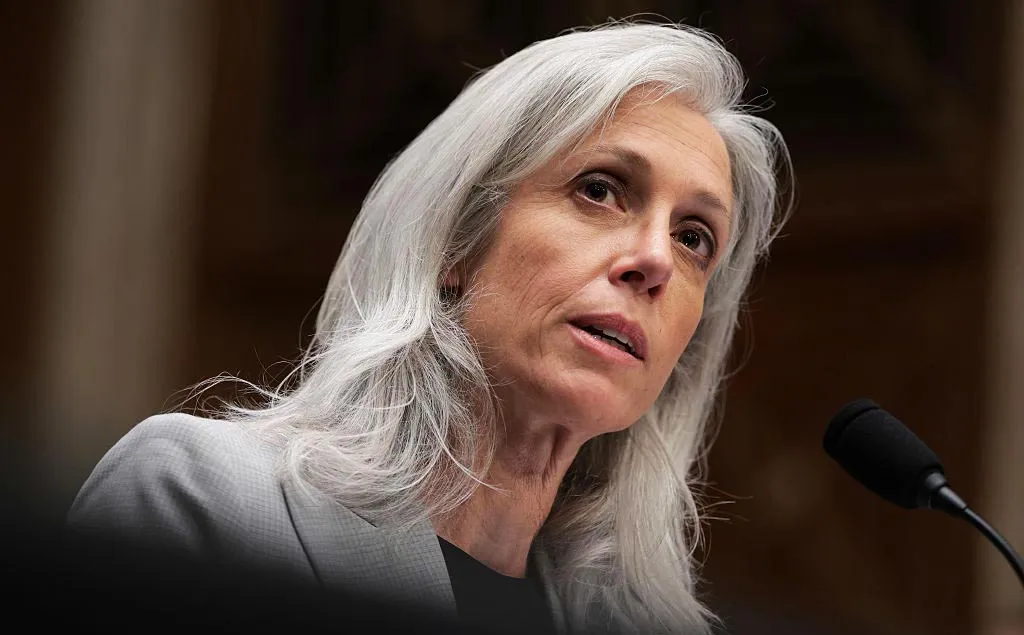
Former CDC Director Susan Monarez at her confirmation hearing in June.
The White House on Wednesday fired Centers for Disease Control and Prevention Director Susan Monarez after she refused to step down.
The Department of Health and Human Services announced on X Wednesday that she was no longer with the CDC. HHS.gov posted on Wednesday, “Susan Monarez is no longer director of the Centers for Disease Control and Prevention. We thank her for her dedicated service to the American people. @SecKennedy has full confidence in his team at @CDCgov who will continue to be vigilant in protecting Americans against infectious diseases at home and abroad.”
Monarez reportedly said that only the president had the authority to remove her.
On X, her attorney Mark S. Zaid said, “When CDC Director Susan Monarez refused to rubber-stamp unscientific, reckless directives and fire dedicated health experts she chose protecting the public over serving a political agenda. For that, she has been targeted. Dr. Monarez has neither resigned nor received notification from the White House that she has been fired, and as a person of integrity and devoted to science, she will not resign.”
White House spokesperson Kush Desai confirmed to Healthcare Finance News that Monarez was fired after she refused to resign.
“As her attorney’s statement makes abundantly clear, Susan Monarez is not aligned with the President’s agenda of Making America Healthy Again,” Desai said by statement. “Since Susan Monarez refused to resign despite informing HHS leadership of her intent to do so, the White House has terminated Monarez from her position with the CDC.”
After Monarez’s termination, three senior CDC leaders, including CMO Dr. Debra Houry, submitted their resignations, according to The Wall Street Journal.
Also submitting their resignations were Demetre C. Daskalakis, director of the National Center for Immunization and Respiratory Diseases; Daniel Jernigan, director of the National Center for Emerging and Zoonotic Infectious Diseases; and Jen Layden, director of the Office of Public Health Data, Surveillance and Technology, according to The Hill.
In an email announcing his resignation, Daskalakis wrote, “I am not able to serve in this role any longer because of the ongoing weaponizing of public health,” according to The Hill report.
WHY THIS MATTERS
Monarez, who has been on the job for less than a month, reportedly clashed with HHS Secretary Robert F. Kennedy Jr. over the CDC’s guidance on vaccines.
Earlier on Wednesday, Kennedy announced that the Food and Drug Administration rescinded emergency use authorizations for COVID-19 vaccines.
Zaid said on X: “First it was independent advisory committees and career experts. Then it was the dismissal of seasoned scientists. Now, Secretary Kennedy and HHS have set their sights on weaponizing public health for political gain and putting millions of American lives at risk.”
In June, RFK Jr., a vaccine skeptic, fired the 17 members of the Advisory Committee for Immunization Practices. ACIP evaluates the safety, efficacy and clinical need of the vaccines.
THE LARGER TREND
Monarez was sworn in as director on July 31.
She had most recently served as acting director of CDC and deputy director for the Advanced Research Projects Agency for Health.
Monarez earned a Ph.D. in microbiology and immunology from the University of Wisconsin–Madison, where she conducted research on developing technologies aimed at the prevention, diagnosis and treatment of infectious diseases. She completed her postdoctoral research fellowship at the Stanford University School of Medicine.
About a week after Monarez was sworn in, a gunman opened fire outside the CDC’s Atlanta campus, killing a police officer and striking six of the agency’s buildings.
Following the shooting, hundreds of current and former employees at the CDC and other federal health agencies wrote a letter to Congress and Kennedy saying the attack came as Americans’ distrust of public health institutions grew and federal leaders politicized and touted health misinformation, according to the WSJ.
Email the writer: SMorse@himss.org